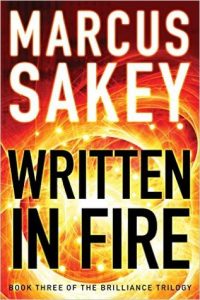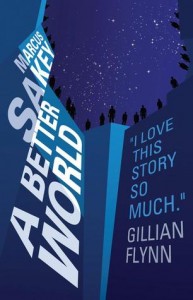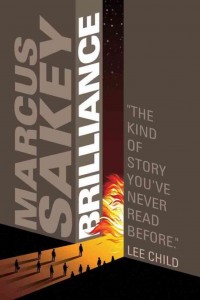 In the world of Brilliance, Marcus Sakey’s trilogy following the adventures of Nick Cooper, a federal agent, some people are born with extraordinary abilities. They don’t shoot laser beams from their eyes, or turn to steel, or anything like that. Rather, they have abilities that all of us have to some degree, but amped up to a much higher level. Some can see the patterns of people moving and thus can slip through a crowd without notice. Others experience time more slowly that normal, and so can react to events much faster than the rest of us. Cooper’s skill allows him to read body language and anticipate what other people are going to do, a useful skill when tracking down criminals.
In the world of Brilliance, Marcus Sakey’s trilogy following the adventures of Nick Cooper, a federal agent, some people are born with extraordinary abilities. They don’t shoot laser beams from their eyes, or turn to steel, or anything like that. Rather, they have abilities that all of us have to some degree, but amped up to a much higher level. Some can see the patterns of people moving and thus can slip through a crowd without notice. Others experience time more slowly that normal, and so can react to events much faster than the rest of us. Cooper’s skill allows him to read body language and anticipate what other people are going to do, a useful skill when tracking down criminals.
In Written in Fire, Sakey takes Cooper on his biggest adventure yet. Without going into detail and ruining the plot, things have gotten out of control between the US government and the Wyoming enclave of the brilliant (the ones born with these abilities), to the point that war may be inevitable. Cooper has to both determine who is doing what — who are the bad guys — and try to stop it.
The problem is, it isn’t clear who the bad guys are. No one thinks of themselves as a bad guy, but rather as someone who has to change the way things are. In Sakey’s world, nothing is black and white — everything is grey. Friends become enemies and enemies become friends. No one is evil, per se, but rather commit evil acts in the name of some greater good, at least in their own mind. However, sometimes, events escape them, spinning out of control.
I really like the greyness of Sakey’s world, as it reflects my own views of the world. Further, while Sakey has created a world of extraordinary people, the themes touch on real world concerns: meritocracy, the rights of minorities, the fear of a changing world, terrorism, the government response to terrorism, personal freedom and responsibility. While Sakey’s world is one of science fiction, the foundation of his world is our own world. He has much to say about the world, but in an even way that presents a nuanced and, yes, grey picture that maybe can help promote dialog.
A couple of quotes that I liked that illustrate this point:
Mostly, people believe they’re doing the right thing. Even the ones who are doing bad things usually believe they’re heroes, that whatever terrible thing they’re doing is to prevent something worse.
When people are scared, it’s easy for them to decide anything different is evil.
He’s broken. Most real-life villains are. Usually it’s not their fault. But that doesn’t matter.
That’s the risk of summoning a demon; they don’t tend to follow orders.
Written in Fire is a fitting end to the Brilliance trilogy, taking it to the greatest of heights and the deepest of depths. It is a great ride that provokes reflection, the way all great fiction should.

